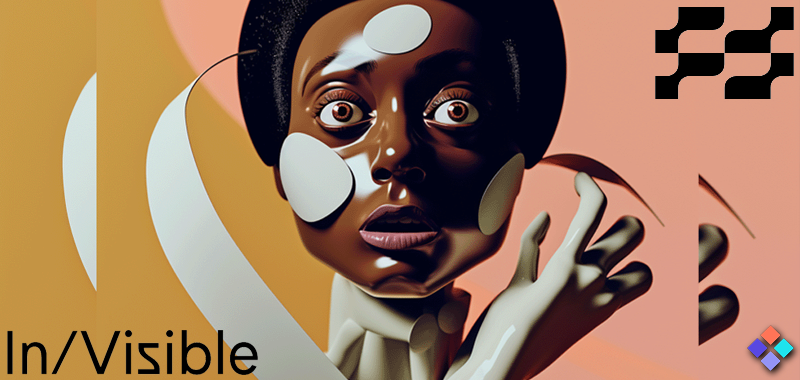Senegalese NFT artist, Linda Dounia Rebeiz, presented a groundbreaking online exhibition IN/Visible on June 12 via the cutting-edge platform Feral File. Her exposition delves into artificial intelligence (AI) not presenting people of color truly, venturing into the depths of AI’s color recognition (or lack of) when generating individuals with diverse skin tones.
A significant lineup of ten black artists, including Rebeiz herself, embark on this innovative journey, diving deep into the weeds of AI platforms’ lack of diversity. All artists are joining forces to challenge the false portrayals through NFT artworks worth 0.55 ETH apiece.
Introducing In/Visible, a group show examining the biases in AI, curated by Linda Dounia Rebeiz
June 12, 2023
14:00 UTC pic.twitter.com/5sRsO1J6LR— Feral File (@FeralFile) May 25, 2023
In/Visible Makes a Call for AI Diversity
Dounia’s NFT exploration, which began in 2021, paved the way for her revolutionary approach. First, using these digital assets to present artworks drawn from her experiences as a woman growing up in Senegal — where she has witnessed the effects of globalization and environmental change first-hand — she effortlessly integrated AI into her creative processes. Now, working alongside the Generative Adversarial Networks (GANs) and instructing them to use her own constructed data, she pushes boundaries to challenge traditional artistic norms.
One controversial element she notices within AI systems when entering terms like ‘Human’, AI platforms, including Midjourney and Dall-E, shape the outcomes in favor of images portraying white men. Conversely, the results of AI-generated keywords for ‘Black person’ misrepresent facial features and body portions and are often distorted. Such outputs showcase AI’s reliance on stereotypes, presenting limited understandings of the origins of black individuals.
The IN/Visible gallery is preparing to communicate these vital challenges powerfully. Dounia’s artworks use deliberate blurring techniques to override AI’s flawed results. Other participating artists, including Minnie Atairu and Serwah Attafuah, will be showcasing visually attractive works of clearly defined faces using expert lighting, which, upon inspection, reveal variances of hair. On the other hand, Zoe Osborne employs filters to soften abnormalities, while the movie maker Jah embraces AI’s imperfections, using the technology to create surreal-looking characters inspired by ancient Egyptian attire and African masks.
Regardless of their differences, all thought-provoking creative pursuits are fundamental to Dounia’s need for change, and raising awareness of these matters is essential. She’s aware that AI developers design interfaces, shape algorithms, and utilize data to train these generative programs. Therefore, strongly believes that by addressing these biases, necessary changes can be made.
By proactively combining efforts to create contextual references through art, the IN/Visible exhibition plays a crucial role in representing cultural diversity in the real world through revolutionary technology.
Want more? Connect with NFT Plazas
Join the Weekly Newsletter
Join our Discord
Follow us on Twitter
Like us on Facebook
Follow us on Instagram
*All investment/financial opinions expressed by NFT Plazas are from the personal research and experience of our site moderators and are intended as educational material only. Individuals are required to fully research any product prior to making any kind of investment.


